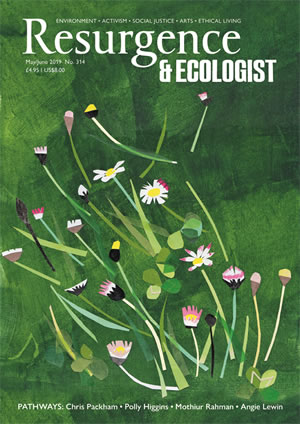Polly Higgins, barrister turned environmental campaigner, is a woman with a mission, and one thing she can’t be accused of is not thinking big enough. Her aim is simple: to create a new international crime of ecocide – the mass destruction of ecosystems, air, water and climate – mirroring the existing international law against genocide, the mass destruction of a people.
The signs are that she is getting somewhere. At COP24 in Katowice in December 2018, both Vanuatu and the Maldives spoke out about the existential threat to small island states from climate change, with Vanuatu’s foreign minister, Ralph Regenvanu, pledging to raise a discussion on ecocide law at the Rome Statute, which underlies the International Criminal Court (ICC), by “raising support for the institution of ecocide as an international crime”.
Others seem certain to follow – even against fierce opposition from the United States in September 2018, when John Bolton, President Trump’s hawkish national security adviser, denounced the prospective ecocide law in a Washington speech, warning that the aim was to “intimidate US decision-makers and others in democratic societies”. As Higgins points out, “The US have no standing at the ICC as they are not members. So it’s all just noise and threats.” If Bolton’s words mean anything at all, it is surely that the prospect of an ecocide law is something that poses a threat to the economic order he represents, which is based on the wholesale destruction of the natural world.
Under the Rome Statute, a new international law is introduced once filed by a single state, and becomes law once backed by seven-eighths of ICC member states. Support among UN states, says Higgins, is strong, if – so far, at least – mostly under wraps. When we meet in her home town of Stroud in Gloucestershire, she is about to head off to The Hague to meet ministers from small island developing states who need an ecocide law as part of their national self-defence against climate change and sea-level rise. She says that 2019 may prove to be a watershed year.
But why exactly do we need an ecocide law? After all, we already have a host of international environmental laws and treaties, like the Paris Agreement on climate change, or the United Nations Convention on the Law of the Sea (UNCLOS). “All these treaties are effectively civil law among states,” explains Higgins. “If one state has a dispute with another over a breach of treaty obligations, it has to go to court and seek justice at its own expense. There is no one to enforce the law, the penalties are often feeble, and no individual can be held to account as the proceedings are purely between states.
“Take the case of fracking. In 2017, I took a road trip through North Dakota and northern Montana to see the fracked fields and communities. It was like driving into hell. Huge tracts of land are now broken up with nodding donkeys [a kind of pump], flares, pipelines, roads, trailer parks... The atmosphere is acrid with the toxic chemicals and combustion products. You can taste it in your mouth. Flaring was going on day and night. It was truly horrific. Now, those fractured communities may have some scope for civil litigation against the fracking companies. But they cannot stop the activity itself. Going to law is very expensive, if there’s a payout it is always too little, too late, and the companies may have gone bust before they ever pay. And all the time the business carries on as usual.
“So civil litigation is not fit for purpose for environmental destruction. This is what is known as ‘missing law’ – law that is obviously needed but is not there. And where you have missing law you get injustice. In the first RBS meeting after the UK government bailed the bank out, there was a press conference and the CEO was asked, ‘Why are you financing the exploitation of the Athabasca tar sands?’ And he just laughed and said, ‘It’s not a crime!’ That’s what we have to change. And we have to go for ‘superior responsibility’ – holding the senior officials, CEOs, heads of state, ministers, directors to account where there has been a reckless disregard of climate and Nature, or even deliberate misinformation. We have to go one step above civil law and make fracking a crime!”
The idea for ecocide law first came to Higgins at a side-event at the 2009 climate summit in Copenhagen. After she had given her speech, a member of the audience spoke of the need for something to stop the mass destruction of ecosystems. “I found myself thinking, yes, it’s there for genocide, but not for ecocide. That was the starting point. I spent three months going back to first legal principles, and then I submitted a proposal to the UN law committee. I naively thought they would do something with it. But they did nothing. And then the Guardian somehow heard of my work and asked me to write about it, and our website got 28,000 hits that first weekend alone! Sometimes an idea whose time has come can land in a big way!”
Higgins and her team are supporting environmental campaigners in the here and now. “We have created our Mission Lifeforce website to build a network of conscientious protectors – thousands of people who are prepared to be arrested in defence of our planet against ecocidal activities like fracking. Conscientious protectors are like conscientious objectors (COs) in war: they are attempting to protect society at large where the government is not giving that protection. Many COs went to prison to establish that principle, which is now enshrined in European Convention on Human Rights Article 9, and UN Declaration of Human Rights Article 18. This is a universal right that you can seek reliance on in a criminal court, to break the law to prevent a more serious crime.”
The whole operation still runs on a shoestring, but Higgins would never let that get her down. “Of course it would be nice to have more money, but then look what we have achieved with next to no money at all! We have largely (if not entirely) decoupled ourselves from the idea that money is necessary to make things happen. All our work is carried out pro bono, and these contributions have a cumulative value of millions of pounds! But yes, there are difficulties. Our mission is a political one, so we cannot be a registered charity under UK law, and this means many trusts and foundations won’t contribute.”
So will 2019 be the year when everything changes? “Watch this space. Every year there is an ICC Assembly, one year in New York, the other at The Hague, where the next one takes place in 2019. If we manage to make a big splash at that meeting, then we are on track!”
Since this interview was conducted, Polly Higgins was diagnosed with pervasive cancer and sadly died on 21st April 2019. Shortly before her death she said, "If this is my time to go, my legal team will continue undeterred. But there are millions who care so much and feel so powerless about the future, and I would love to see them begin to understand the power of this one simple law to protect the Earth, to realise it’s possible, even straightforward. I wish I could live to see a million Earth Protectors standing for it - because I believe they will." To find out more about Polly’s work and sign up to become an Earth Protector, visit: www.stopecocide.earth.








